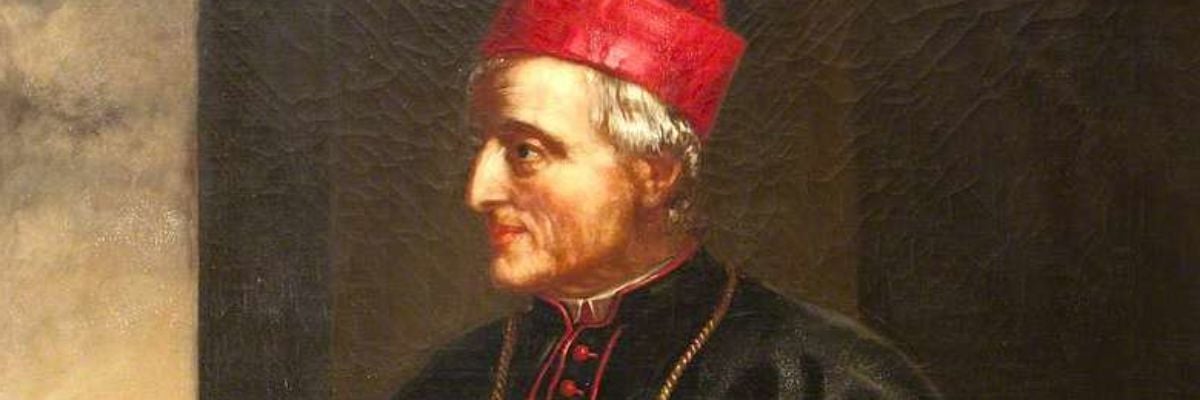
St. John Henry Newman to Become a Doctor of the Church
On July 31, 2025, Pope Leo XIV announced St. John Henry Newman will soon become the thirty-eighth Doctor of the Church. This is one of the highest honors in the Catholic Church, recognizing Newman’s lasting impact on theology, education, and spiritual formation. Newman joins a select group of saints, including Augustine, Aquinas, and Thérèse of Lisieux. Their writings, witness, and impact on the Church hold up as universally relevant for all time.
Pope Leo XIV will proclaim St. John Newman a doctor of the Church on November 1, which is also the solemnity of All Saints.
So, why St. John Henry Newman? His profound insights into the development of doctrine, his defense of the proper role of conscience, and his deep commitment to truth have shaped Catholic thought for generations. A convert, priest, cardinal, and educator, Newman’s legacy bridges faith and reason, tradition and progress.
What Is a Doctor of the Church?
The Catholic Church bestows the prestigious title “Doctor of the Church” upon saints whose theological, spiritual, and educational wisdom has greatly influenced the faithful throughout Church history. While there are four original Doctors of the Church (St. Gregory the Great, St. Ambrose, St. Augustine, and St. Jerome), the Church continues to recognize new ones. Most recently in 2022, St. Irenaeus was declared a Doctor of the Church by Pope Francis.
The process by which one becomes a Doctor of the Church is extensive, and similar to the canonization process.
Who Was John Henry Newman?
John Henry Newman was born in London in 1801, to a French Huguenot (Protestant) mother and an English banker father. Newman would later rise as a prominent leader in the Anglican Oxford Movement. He sought to revive Catholic elements within the Church of England, and so he began an intense study of Church history. Through reading the early Fathers, he concluded that the fullness of Christian truth existed only in the Catholic Church. In 1845, at the age of forty-four, John Henry Newman entered into full communion with the Catholic Church. Just two years later, in 1847, he was ordained a Catholic priest. On May 12, 1879, he was made a cardinal under Pope Leo XIII.
St. John Henry Newman founded the Birmingham Oratory in England and the Catholic University of Ireland (now University College Dublin). Pope Francis canonized him a saint in 2019, and today Newman is known as the patron saint of students, namely students at secular universities. His feast day is celebrated on October 9.
Why Did Newman Become Catholic?
Newman began wrestling with the Evangelical Anglican beliefs of sola fide, or “faith alone,” around the age of twenty-seven. He believed individualism was a deadly ideology and in direct conflict with authentic Christianity. It was through his skepticism of key Protestant beliefs, as well as the death of his sister in 1828, that he came to read the early Church Fathers. Newman’s journey to the Catholic Church was not emotional but intellectual and spiritual. He famously wrote,
“To be deep in history is to cease to be Protestant.”
After seventeen years of reading, conversing, and grappling, Newman finally entered the Catholic Church. It was the early Church Fathers that led him to recognize that apostolic authority and doctrinal unity could only be found in the Catholic Church. His conversion in 1845 cost him friends, prestige, and even family. However, because of his his association with the Anglican Oxford Movement and then his conversion to Catholicism, some members of that movement eventually followed him into full communion with the Church. Newman’s personal integrity and theological rigor have inspired countless other converts and seekers.
Free Download | St. John Newman Prayer Card
What Is the Development of Doctrine?
Newman’s landmark work, An Essay on the Development of Christian Doctrine, argues that true doctrinal growth is organic, and not an innovation for its own sake. Rather, it’s a deepening of understanding over time, as the Holy Spirit reveals more and more.
He wrote:
“The parts and proportions of the developed form, however altered, correspond to those which belong to its rudiments. Young birds do not grow into fishes.”
This principle helps the Church distinguish faithful doctrinal development from erroneous innovation, a principle the Second Vatican Council also addressed.
What Did Newman Teach About Conscience?
Many misunderstand Newman’s perspective on the role of our conscience. Newman never sought to place personal conscience above Church teaching; rather, he upheld conscience as the “aboriginal Vicar of Christ,” or an inner voice that must be formed by divine truth, not personal preference.
In his Letter to the Duke of Norfolk, Newman wrote:
“[Conscience] is a messenger of him, who . . . teaches and rules us by his representatives [i.e., the Magisterium].”
This harmonizes with Vatican II’s Gaudium et Spes, which affirms:
“Man has in his heart a law written by God . . . to obey it is the very dignity of man” (GS 16).
Why Newman Matters Today
From defending the Faith against relativism, division, and poor catechesis, Newman’s influence and writings are crucial now more than ever. Catholic apologists continue to draw on his insights to evangelize a secular culture. Educators quote him to defend the integration of faith and reason. And prospective converts continue to seek his wisdom as they navigate their faith journey.
St. John Henry Newman, future Doctor of the Church, pray for us!
Related Content
Articles
Truth and Conscience with the Church’s Newest Saint
John Henry Newman: Doctor of the Church!
Q & As
Is following your conscience the only requirement for living a moral life?
Resources
Getting Started with the Fathers of the Church
The Catholic Answers Guide to an Examination of Conscience
Books
The Fathers Know Best: Your Essential Guide to the Teachings of the Early Church
The Early Church Was the Catholic Church
The Convert’s Guide to Roman Catholicism: Your First Year in the Church



